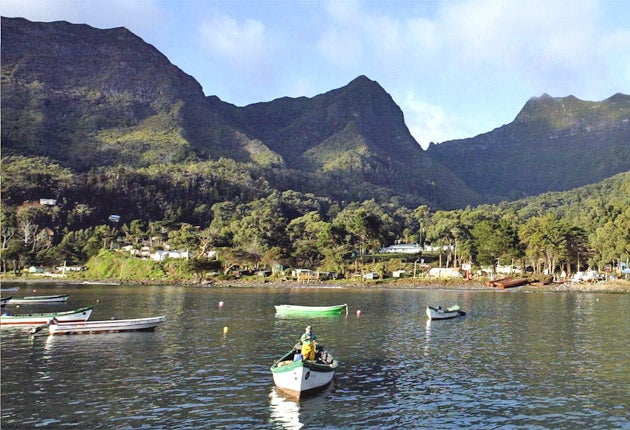How 12-year-old girl saved her Chilean island from catastrophe

Your support helps us to tell the story
From reproductive rights to climate change to Big Tech, The Independent is on the ground when the story is developing. Whether it's investigating the financials of Elon Musk's pro-Trump PAC or producing our latest documentary, 'The A Word', which shines a light on the American women fighting for reproductive rights, we know how important it is to parse out the facts from the messaging.
At such a critical moment in US history, we need reporters on the ground. Your donation allows us to keep sending journalists to speak to both sides of the story.
The Independent is trusted by Americans across the entire political spectrum. And unlike many other quality news outlets, we choose not to lock Americans out of our reporting and analysis with paywalls. We believe quality journalism should be available to everyone, paid for by those who can afford it.
Your support makes all the difference.At 6am last Saturday on an isolated Pacific island, there were few people around to notice as lobster fishing boats moored in the tiny harbour started to bob crazily and crash together. It was the first sign that the tsunami that followed the Chilean earthquake was soon to wreak terrible carnage on Robinson Crusoe Island and its tightly knit seaside fishing community.
After a tsunami early warning system failed, the island's only village was at the mercy of the waves. It took the intervention of one 12-year-old girl to save the majority of the 650 islanders.
Martina Maturana, the daughter of the community's policeman, was at home when she felt a tremor, according to Chile's La Tercera newspaper. Her father was on the telephone to the mainland when Martina peered out of the window at the pitching boats and acted decisively. She ran 400 metres from her home to the town square to ring the emergency bell and rouse the fishing community from their sleep.
Martina did not know the emergency codes for ringing the bell – two rings for fire, three for landslides – but her prompt actions nevertheless prompted other islanders to flee to the safety of high ground, according to the newspaper.
The warning gave them the opportunity to follow the evacuation signs set up for such an emergency and escape the massive incoming wave triggered by the earthquake off Chile. A few minutes later, waves crashed on to the land and swept 300 metres into the village, destroying homes, schools and killing up to eight people.
Eight others were seriously injured and evacuated from the island – but many more were grateful for the intervention of the young girl. "We took off and three minutes later the sea rose 20 metres high, and a large wave came and destroyed my house," one man told Chilean television as he stood among the splintered wood and debris of his home. "I heard all the wood creaking and then this part collapsed and the sea carried away the whole house."
The story filtered out from the island yesterday, a rare piece of warming news four days after the 8.8 magnitude earthquake that killed about 800 people predominantly on the mainland of south-central Chile. Robinson Crusoe Island, the largest of three in the Juan Fernandez archipelago, was named in honour of a Scottish mariner called Alexander Selkirk who is said to have inspired Daniel Defoe's classic tale.
Little news has emerged of the northernmost of the three islands – named Selkirk – where some 40 islanders from Robinson Crusoe decamp for up to eight months of the year to fish, and were there when the tsunami struck.
"The little village there is on the east side of the island and would have been completely exposed to the whole of the tsunami," said Dr Peter Hodum, a US-based conservation biologist who has spent 10 years travelling and working on the island. "I don't think they would have had any forewarning."
Television pictures showed devastation on the foreshore of Robinson Crusoe Island with broken homes and planks of wood floating on the inshore. One vehicle was on its side in a gash in the ground. "It's just a barren coastal strip," said Dr Hodum. "It's been destroyed. There was a school, a pre-school, the municipal offices, churches, a cultural centre, a number of homes and most of the shops. They've all gone."
The island's mayor, Leopoldo González, said a naval ship had arrived with medicine and rescue equipment but many people were still missing. Many Chileans were furious about the lack of official warning. "We can't depend on a little girl," said one comment on La Tercera's website.
Join our commenting forum
Join thought-provoking conversations, follow other Independent readers and see their replies
Comments